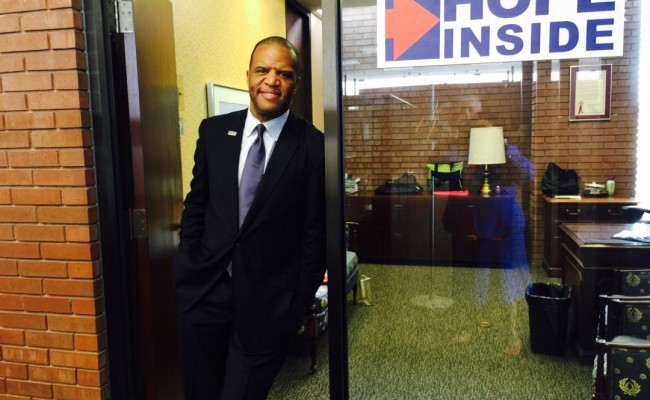When John Hope Bryant looks around Detroit, he sees the city has all of the elements it needs to be successful: Its location is outstanding. It has strong small businesses. It has stable leadership.
 The only thing missing? Energy. Inspiration. Drive. The power of long-term vision. Leaders here have spent so much time getting the basics into the hands of the residents – lights, safety services, home mortgages, jobs – that they don’t have time to dream. To find ways to boost neighborhoods. To give people a sense of community. To give them hope.
The only thing missing? Energy. Inspiration. Drive. The power of long-term vision. Leaders here have spent so much time getting the basics into the hands of the residents – lights, safety services, home mortgages, jobs – that they don’t have time to dream. To find ways to boost neighborhoods. To give people a sense of community. To give them hope.
Together with the Detroit Regional Chamber President and CEO Sandy K. Baruah, Hope Bryant and more than 800 community investors came together this past week at the Detroit Policy Conference. The duo sat down together with Mark S. Lee to discuss this “inspiration gap” and what Detroit, the region and the state can do to improve neighborhood resilience and hopefulness.
 “We need Detroit to be bilingual; it needs to understand English and money,” Hope Bryant told Lee during his interview with the radio host. That is why he wants to open at least 20 “HOPE Inside” centers in the city to help residents understand their credit scores, how to handle their money and get on the road to financial stability. It is a project that has the Chamber’s involvement as well as that of Mayor Mike Duggan.
“We need Detroit to be bilingual; it needs to understand English and money,” Hope Bryant told Lee during his interview with the radio host. That is why he wants to open at least 20 “HOPE Inside” centers in the city to help residents understand their credit scores, how to handle their money and get on the road to financial stability. It is a project that has the Chamber’s involvement as well as that of Mayor Mike Duggan.
For Baruah, the Detroit Policy Conference is the ideal place to have conversations about Detroit, its neighborhoods and its next steps. Now in its fifth year, the Conference brings together so many movers and shakers that it has the potential to find answers to some of Detroit’s most difficult questions.
“There is tremendous interest across a whole range of businesses” to bring Hope Bryant’s Hope Inside program to Detroit, Baruah told Lee. Individual businesses have stepped up to put these financial literacy centers to the city. However, the growth has to larger and faster, Baruah said.
“What we’re missing is that one or two really big entities that want to do multiple ones. We’ve moved beyond an organization wanting to do one site. We need an organization that wants to do multiple sites,” Baruah said.
“This is about transforming the lives of individuals, families and communities,” Baruah said. “You start transforming communities, you’re transforming the economy. When you transform the economy, it truly rises all boats. That’s why we care about the neighborhoods.”
That means private investment and market-based prescriptions to be sustainable, Baruah said. Help from the government and philanthropy is the catalyst – it can be transformative and get the ball rolling. But market-based solutions are the next step in this all-important process, he told Lee.
 Hope Bryant agreed. He talked about the importance of boosting Detroit’s financial health as a key to its long-term investment. If residents and neighborhoods are always struggling, then no one has the money to pay for dinners at restaurants, haircuts at barber shops or other economic drivers. Without someone to shop there, these businesses will close. And Detroit will find itself in the same position it has been for decades.
Hope Bryant agreed. He talked about the importance of boosting Detroit’s financial health as a key to its long-term investment. If residents and neighborhoods are always struggling, then no one has the money to pay for dinners at restaurants, haircuts at barber shops or other economic drivers. Without someone to shop there, these businesses will close. And Detroit will find itself in the same position it has been for decades.
“Small business is driving all cities, including Detroit” Hope Bryant said. “Consumer spending is 70 percent of the economy; if everyone is struggle to pay basic bills, they cannot spend in small businesses.”
To hear more of Hope Bryant’s comments, go to the Detroit Regional Chamber’s YouTube channel.
The HUB’s multi-platform Detroit Policy Conference coverage team also includes The HUB’s columnist Karen Dumas, host of The PULSE on Superstation 910AM, Mark Lee, host of Small Talk with Mark S. Lee on WXYT 1270 AM and Detroit Smart Pages Publisher Beverly Smith.


